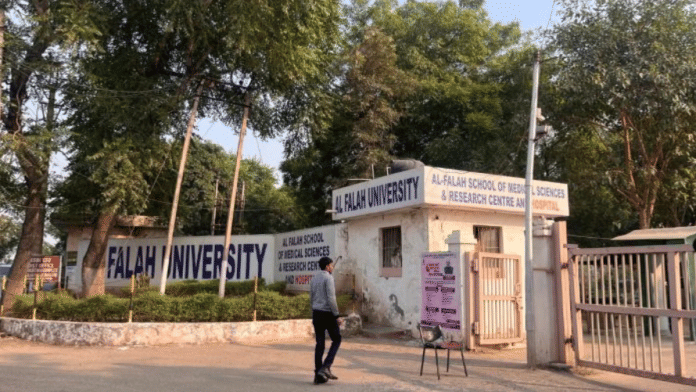New Delhi: Faridabad’s Al-Falah University, which came under scrutiny after the Red Fort blast, was established under a Haryana law that experts say is robust in scope, but limited in enforcement.
Three of the university’s employees, among them the doctor who allegedly drove the car that exploded, have been linked to the November 10 blast in central Delhi that killed 15 people. The Enforcement Directorate (ED), earlier this week, also arrested the university’s founder Jawad Ahmed Siddiqui in a money laundering case.
Al-Falah was set up in 2014 under the Haryana Private Universities Act.
Former education department officials told ThePrint that the legislation contains detailed provisions to keep checks on financial discrepancies and quality controls. It also specifies punitive measures for not following the norms. But monitoring and oversight, they said, is apparently lacking.
Passed in 2006, the original Haryana Private Universities Act recognised private institutes in the state, but it was years later that the law was given teeth. Its most detailed amendment was made in 2014, followed by minor changes thereafter. These gradually eased land, infrastructure and approval requirements to make it easier for institutes to open campuses even as regulatory standards were strengthened.
Al-Falah, which began as an engineering college in 1997, was recognised as a private university in 2014. Currently, the state has 25 private universities, including Al-Falah.
Also Read: Al-Falah founder’s arrest ‘key to mapping laundering nexus’. What ED told Delhi court
Financial oversight
A former official of the education department said Sections 42 and 43 of the law mandate that private universities should prepare and submit their annual reports and audited financial statements, including balance sheets and audit reports, to the governing bodies and the state government every year.
“The challenge has always been its enforcement. There is still no proper mechanism to ensure these rules are followed rigorously,” the official said.
Al-Falah University is a case in point. The ED, which arrested the university’s founder on 18 November under the Prevention of Money Laundering Act (PMLA), said it had found incriminating pieces of evidence, showing that funds collected from the public and students’ fees were diverted for personal use by the founder.
Section 13 of the law also mandates that universities’ ‘general funds’—made up of student fees and other charges—must be used solely for educational and administrative purposes.
“If Al-Falah university had submitted its real time financial statements and records with the department, these issues could have come to light earlier. It clearly shows there was no proper monitoring,” the official quoted above said.
It’s likely that Al-Falah is not the only university flouting the norms, the official added.
Monitoring remains a problem in most states. “But some states such as Tamil Nadu and Andhra Pradesh have better systems in place when it comes to implementing laws governing private universities,” the official said.
Professor Hemant Verma, former joint director at Haryana’s higher education department and vice-chancellor of Gurugram’s SGT University, pointed out that there are strong checks and balances built into the Haryana Private Universities Act.
“Many of its clauses are punitive in nature, allowing the government to take action whenever there is any deviation from the prescribed rules,” he said. Verma added that during his time in the education department, they developed a system to ensure every private university regularly updates basic information they are required to under the Act.
“At the same time, certain areas must remain within a university’s own domain as per academic autonomy entrusted to them. For instance, the selection of faculty is fundamentally an autonomous function as per UGC prescribed regulations,” he said.
Accreditation failures went unnoticed
Section 40 of the Act makes it mandatory for private universities in Haryana to obtain accreditation from the National Assessment and Accreditation Council (NAAC, the national quality assessment body) or the National Board of Accreditation (NBA) within five years of its establishment. It states that the universities must also inform the government and other relevant regulatory bodies about the grade awarded by the accrediting agency. The accreditation must then be renewed periodically.
But the Act does not impose strict penalties or effective checks for non-compliance.
Notably, even 11 years after its establishment, Al-Falah University did not obtain accreditation from NAAC. Only two of its three colleges were ever accredited and that too wasn’t renewed after expiration. The NAAC last week issued a notice to the university for this violation.
ED alleged that by fabricating its NAAC accreditation, Al-Falah University misled students and parents while continuing to attract admissions and generating at least Rs 415 crore that was diverted as “proceeds of crime”.
Another former bureaucrat who had served in the Haryana higher education department said the fact that the university operated for years without proper accreditation indicates a lack of effective checks.
No faculty background verification
There is no provision in the Haryana law to carry out background checks of faculty members and staff at universities. The Act only requires private universities to comply with University Grants Commission (UGC) norms for hiring staff.
Guidelines by UGC, which dictates higher education standards in India, focus on educational qualification for teachers. They, too, do not mention any requirement for background or police verification.
“Police verification is conducted before hiring in central and state universities as well as in government jobs. Private universities should follow this practice too. However, the manner of implementation can be left to the universities to maintain their autonomy,” the former bureaucrat quoted above said.
The official noted that most state laws across states lack such mandatory background checks for faculty.
“The Tamil Nadu Act mentions background checks for the trust or sponsoring body of the university, but not for individual faculty or staff. Similarly, Assam mandates such checks only for the sponsoring authority, not individuals,” he said.
Al-Falah University and Haryana’s higher education department did not respond to requests for comment till Friday morning.
(Edited by Prerna Madan)






